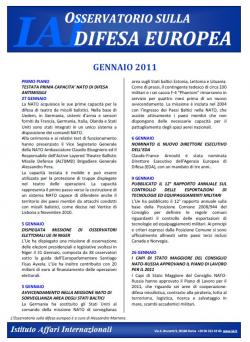Observatory on European defence, May 2005

23 May 2005
General Affairs and External Relations Council, EU Defence Ministers - Capabilities, European Defence Agency
The meeting of the EU Defence Ministers focused on the issue of military capabilities. A catalogue of requirements for European crisis management forces was adopted.
The objective set for the beginning of 2007 is for the EU to be able to sustain simultaneously two rapid intervention operations involving the Battlegroups which are currently being established.
The Council recommended that action be taken to make the decision-making and the planning process more rapid, so that it takes a maximum of 5 days to go from approval of the Concept of crisis management by the Council to the effective decision to launch an operation.
In the ECAP (European Capabilities Action Plan) framework, the Council analysed the report on progress in the military capabilities field and, in particular, the Capability Improvement Chart I/2005, a detailed document that records the progress and the shortfalls in implementing the EU Capability Development Mechanism (CDM). The situation has improved in a few areas: deployable laboratories, seaport disembarkation (SPOD) units, OHQs and mechanized infantry battalions.
Previously, on 10 May the Council adopted a decision that modifies the organization of the EU Military Staff; the new structure takes into account the new tasks and the role of the civ/mil planning cell being established, particularly important in cases of autonomous EU-led operations.
Alongside the Council, the Steering Board of the European Defence Agency (EDA) met under the chairmanship of the High Representative for CSFP Solana.
The Agency urged the member States to undertake greater cooperation in order to achieve the highest level of standardisation, underlining the possibility of developing groups of users to maximise cost effectiveness.
Moreover, concerning the development of a common defence market, the EDA was entrusted with studying the use that member States make of the exemption from the common market regulations foreseen by Article 296 ECT.
On 26 May, Solana appointed Lo Casteleijn from the Netherlands as Chief of the EDA Steering Board in the sub-ministerial formation “National Defence Planners and Policy Directors for Capabilities”.
May 2005
EU Missions - Congo, Sudan
The missions in Africa represented an important part of the European monthly schedule.
On 2 May, the Council approved a Common Action for the launching of the EUSEC-RDC mission to assist security reforms in Congo (RDC), foreseen for a period of 12 months from 8 June, with a budget of about 1.6 million euros.
The mission is to support reform of the local administration by sending experts in the field of reorganization of armed forces, police and armed groups.
The operation is complementary to the EUPOL Kinshasa police mission, which started last month.
Given the serious situation in the Sudanese region of Darfur, COPS held a meeting on 3 May to examine the proposals for providing further logistic support to the Amis II African Union (AU) mission, including civil, military and protection forces.
However, to favour the expansion of the AU mission (from 3,320 to 7,700 men by September 2005, with a cost of 365 million euros per year), the dispatch of soldiers is not foreseen.
The General Affairs and External Relations Council of 23 May confirmed the embargo on military equipment to the Sudanese government imposed in 1994; previously, on 12 May, the European Parliament approved a common resolution on aid to Sudan (450 million euros), asking the Commission to condition access by the Sudanese government to the funds on progress in the peace process in Darfur.
NATO is also preparing to intervene; the North Atlantic Council (NAC) meeting of 18 May urged the NATO military authority to carry out a feasibility study for an assistance mission in Darfur; on 24 May the NAC approved some initial military options concerning the intelligence, training, planning and strategic transport for the AU mission; it would be the first NATO intervention in Africa.
The Atlantic Alliance’s initiative has created some friction with the EU.
May 2005
European Union - International Terrorism
The fight against international terrorism was at issue in the European political debate.
On 10 May, the European Commission presented a five-year Action Plan in the area of freedom, security and justice policies.
The proposals submitted concerned creating a warning network among police forces, surveillance of critical infrastructures, communicating information relative to explosives, preventing and managing the consequence of attacks and countering the financing of terrorist groups.
For this purpose, on 26 May the European Parliament approved the third Directive on the prevention of money laundering.
Moreover the General Affairs and External Relations Council of 23 May approved a report concerning the contribution of the European Security and Defence Policy (ESDP) to the fight against terrorism; this document, regularly updated, aims to ensure coherence and synergy among the different actions undertaken against terrorism in EU field.
In the framework of national forces cooperation, on 12 May the Home Ministers of France, Germany, Italy, the United Kingdom and Spain announced their will to create a European police force to intervene at the EU’s external borders.
-
Details
Roma, Istituto affari internazionali, 2005 -
Issue
05/05


